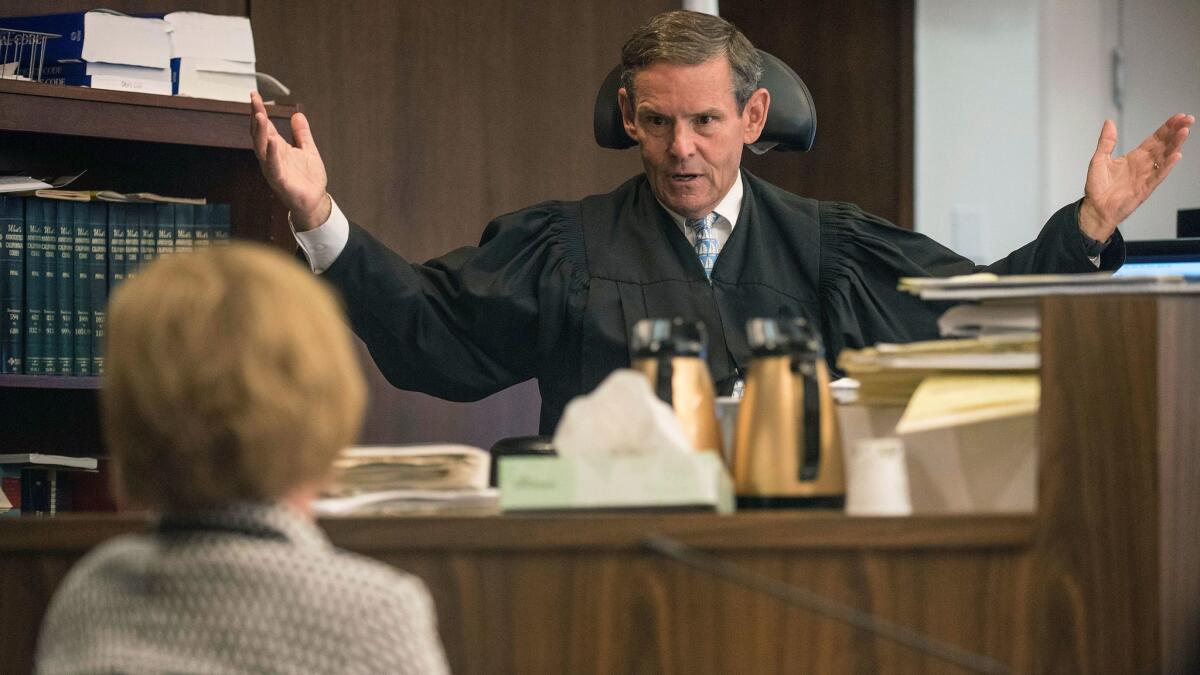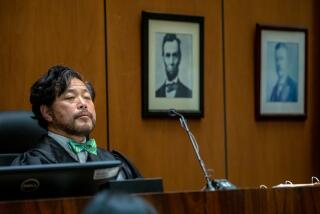In closing arguments, Seal Beach killer’s attorney blasts use of O.C. jail informant

In closing arguments Thursday, attorneys for a former tugboat captain who pleaded guilty to murdering eight people at a Seal Beach salon in 2011 slammed prosecutors for what they called “incredible” deception — saying there is not enough evidence to move forward with a penalty phase to decide whether Scott Dekraai goes to death row.
The prosecution has sought to use evidence from a veteran jailhouse informant against Dekraai, hoping to boost the chances that the killer will be sentenced to death.
But Scott Sanders, Dekraai’s defense attorney, blasted the use of the “snitch” and what he described as a systematic network controlled by the Orange County Sheriff’s Department designed to thwart his client’s case.
The department “is holding back evidence” that could be helpful to his client, Sanders said. “This is a rogue department. They decided they didn’t have to follow the rules…. This concealment could go on forever because when people don’t want to tell the truth, we really have no sense of what’s left.”
The so-called snitch scandal has rocked the Orange County district attorney’s office and the Sheriff’s Department — and delayed Dekraai’s sentencing for the mass murder.
Superior Court Judge Thomas Goethals has criticized sheriff’s officials, who have vowed to search diligently for jailhouse records he has demanded.
Sheriff’s officials have repeatedly told the judge there were no more records to be found — only for other material to be subsequently discovered.
“How does this happen?” Goethals asked Sheriff Sandra Hutchens last month. “They were dead wrong.”
“They possibly did not look hard enough,” replied Hutchens, who also acknowledged that informants had been placed near targeted inmates in the Orange County jail for years with the aim of eliciting incriminating statements.
Dekraai pleaded guilty to murdering his ex-wife and seven other victims in the salon shooting.
But the informant scandal has delayed proceedings to determine whether he will face the death penalty. Dekraai’s attorney has argued that the death penalty should be tossed out because authorities cannot be trusted to turn over relevant evidence.
“Removal of the death penalty is a reasonable response to outrageous conduct,” Sanders said as he began a final defense argument in the penalty phase.
But Michael T. Murphy, the deputy attorney general who’s trying the case, countered. “This is not about what did the Sheriff’s Department do right or wrong,” he said, adding that the primary evidence should focus on “what did this man do and what does he deserve?”
The defense’s belief that there are records showing “good behavior on the part of the client” is “preposterous,” Murphy said.
On Thursday afternoon, Goethals said he expects to rule on the death penalty issue by the end of next week.
Sanders argued that jailhouse informants and their handlers have violated the rights of inmates for years by coaxing information from defendants who are represented by lawyers. An appellate court upheld Goethals’ decision to remove the district attorney’s office from Dekraai’s case, adding that sheriff’s deputies were clearly moving informants around the jail to place them near specific inmates.
Defense attorneys in other cases have since argued that prosecutors failed to disclose information about the use of informants during discovery, which would violate their clients’ rights.
Last year, the fallout led Goethals to order a retrial for an Anaheim man who was convicted of aiding in the 1998 murder of a pregnant woman.
An informant’s testimony was used against the man at a 2006 trial, but a defense attorney argued prosecutors had failed to disclose information about the witness’ history as an informant.
In Dekraai’s case, the informant was a former shot-caller in the Mexican Mafia who had become a prolific source in hopes of gaining a reduced sentence.
In June, the county’s grand jury dismissed the entire scandal as a “myth,” releasing the findings of a months-long investigation that was hailed as vindication by prosecutors and dismissed as a whitewash by defense attorneys.
In a 28-page report, the grand jury said critics and media outlets had blown the scandal out of proportion after it became central to the case of Dekraai.
But the report is unlikely to be the final word, as the U.S. Justice Department and the California attorney general’s office are investigating the matter.
Twitter: @newsterrier
ALSO
Despite grand jury findings, fallout from O.C. jailhouse snitch scandal is far from over
Judge ‘underwhelmed’ by sheriff’s search for evidence in O.C. snitch scandal
Orange County jailhouse informant program went on for decades, mass shooter’s lawyer claims
UPDATES:
5:25 p.m.: This article was updated with additional details from the court hearing.
This article was originally published at 3:10 p.m.
More to Read
Sign up for Essential California
The most important California stories and recommendations in your inbox every morning.
You may occasionally receive promotional content from the Los Angeles Times.











